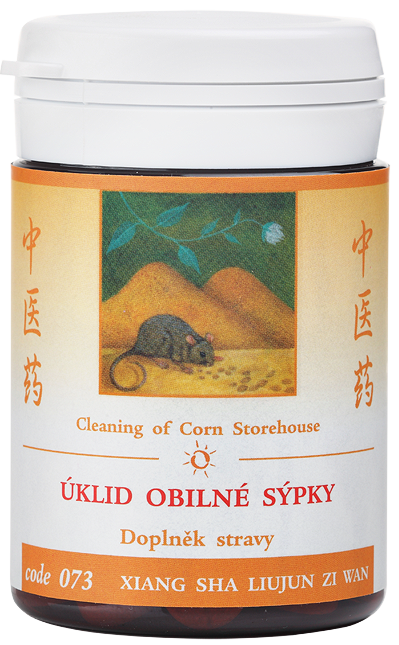
- Bai zhu (Atractylodis Rhizome)
- Fu ling (Hoelen)
- Chen pi (Tangerine Peel)
- Dang shen (Codonopsis Root)
- Zhi ban xia (Pinellia Rhizome)
- Shan zha (Hawthorn Fruit)
- Bai shao (White Peony Root)
- Chai hu (Bupleurum Root)
- Da zao (Jujube Berry)
- Sheng jiang (Fresh Ginger Rhizome)
- Zhi gan cao (Licorice Root)
- Microcrystalline cellulose (MCC) 1%
Affects based on the TCM:
- Supplements qi of spleen PI QI XU
- Harmonizes and warms stomach WEI HAN XU
- Brisks up stagnant QI ZHI
- Disperses damp phlegm TAN SHI
- Relieves pain
Usage:
- Feeling surfeit even after small amount of food
- Feeling of pressure or pain around the stomach
- Belching
- Mushy stool or constipation on the contrary
- Flatulence to vomiting with loss of appetite
- Gastric ulcers (Ulcus peptic)
- Chronic stomach inflammation (chron. gastritis)
Description according to traditional Chinese medicine: This is a modification of the original traditional Chinese herbal mixture XIANG SHA LIU JUN ZI WAN, adjusted to meet today’s needs. This mixture is intended for adjusting digestive disorders such as feeling of fullness, passing into a dull stomach pain, flatulence, pressure around the navel, belching, feeling of “overeating” even after a small amount of food, increased fatigue after a meal, mushy stools or constipation that often alternate, nausea or vomiting. In today’s society, full of haste and stress, improper food, its improper composition and consumption of food “on the go” very often result in digestive disorders. The mixture is also good in case of morning sickness in pregnant women.
Packaging: 100 tablets / 30 g (100% natural, natural cellulose max. 1% is the only binding agent; made from concentrated herbs at a ratio of 5:1, i.e. 5 g of dried herbs are used per gram of herbal tablets)
Dosage: 3 times daily 4 tablets, children over 3 years of age 3 times daily 2 tablets
More information about dosage and using herbal tablets.
Click here to search where to buy XIANG SHA LIU JUN ZI WAN on Google

- Bai zhu (Atractylodis Rhizome)
- Fu ling (Hoelen)
- Chen pi (Tangerine Peel)
- Dang shen (Codonopsis Root)
- Zhi ban xia (Pinellia Rhizome)
- Shan zha (Hawthorn Fruit)
- Bai shao (White Peony Root)
- Chai hu (Bupleurum Root)
- Da zao (Jujube Berry)
- Sheng jiang (Fresh Ginger Rhizome)
- Zhi gan cao (Licorice Root)
- Microcrystalline cellulose (MCC) 1%
Each batch of our herbal products is tested in the accredited Phytax laboratory for medicines in Schlieren (Switzerland). This testing identifies herbs, but also heavy metals (mercury, cadmium, lead, arsenic, and copper), bacteria (E. coli, salmonella, total number of bacteria), mould, yeasts and aflatoxins. TCM Herbs is the only supplier in Europe that tests each batch of herbs for all its herbal tablets. Among other things, the herbal products are tested for 511 types of pesticides (4 groups). This is because pesticides have become a worldwide problem, especially in products from the so-called third world. Customers buy herbal products in the belief that they are completely natural, but often these products are “contaminated” with other undesirable “chemicals”.
The herbal tablets and beverages from our company (TCM Herbs) are the only ones in Europe to have been additionally tested. Among others, our products are tested for 511 pesticides — and this number is continuously increasing due to the use of new pesticides. Pesticides are now becoming a global problem! Such a range of checks on pesticides cannot even be detected in laboratories in Europe. Neither is anyone testing it, because unfortunately European legislation does not require these examinations. This comprehensive testing of each batch, and each herb beyond the normal examinations does require considerable financial costs, but the quality of herbs and safety of our products is our absolute priority.
Laboratories are different
A certified laboratory for food supplements is obliged to examine the presence of heavy metals, fungi, and bacteria. However it only determines a smaller range of pesticides and its requirements for their quality content in herbs are lower.
On the other hand, a certified laboratory for medicines also identifies individual herbs and, in particular, tests the entire range of pesticides (at least 500 types) and has higher requirements for the quality in herbs. In the EU, there are only a few laboratories like that and the prices for their services are rightly high. Today, it is therefore very important to know which laboratory tests the dietary supplement and what the tests are focused on; if each batch and each herb are tested, or just a random sample, for how many pesticides, how many added ingredients and how many additional binding agents the product contains, etc. – otherwise consumers could be easily deceived and disappointed (you can find more details at Safety and Quality of TCM Herbs Products).
All our herbal products are tested in a certified laboratory for medicines.
The above information implies that herbal tablets and drinks of TCM Herbs are, in terms of quantity (concentration of herbs in the mixture is 5 times higher, i.e. 1 g of a herbal tablet equals 5 g of raw herbs) and quality (unprecedented testing of each batch), among the best products we can imagine and enjoy in terms of today’s natural medicines.


